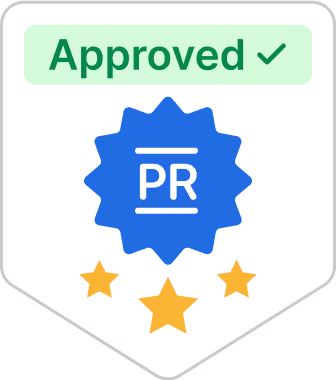The difference between sole proprietorship vs LLC

It’s time to make your small business official. You may be wondering: Should I choose a sole proprietorship vs LLC model?
A Limited liability Company (LLC) offers flexibility and liability protection, while sole proprietorships offer unlimited control and are extremely simple to form.
Both structures have benefits and drawbacks depending on what kind of business you’re running. In this brief guide, we’ll outline the basics of each structure before highlighting the four key distinctions between an LLC and a sole proprietorship.
We’ll also include notes on when you should consider growing your sole proprietorship into an LLC.
What is the difference between sole proprietorship and LLC?
What is the difference between a sole proprietorship and LLC? To best answer this oft-asked question, let’s break down the defining features of each business structure.
What is sole proprietorship?
So, what is a sole proprietorship? A sole proprietorship is an unincorporated, free-to-form business with just one business owner. The business and owner are one and the same.
When business owners are figuring out how to start a sole proprietorship, they’ll need to fill out the appropriate paperwork. Sole proprietors do not need to register with the state in which they are operating, and many sole proprietors operate under their own name.
Depending on the state in which they live, sole proprietors may need to file for certain business licenses or permits with the state, city, or county. If you’re a sole proprietorship, call today for assistance on how to apply for EIN.
Examples of sole proprietorships
You may be a sole proprietor and not even know it! Common sole proprietorships include:
- Freelance writers and designers
- Accountants
- Chefs
- A neighborhood grocer
- A small boutique
- Personal trainers
Sole proprietorship taxes
A small business owner may choose the sole proprietorship model because the tax process is so simple. Simple taxes is one of the many benefits of a sole proprietorship. Because sole proprietors are indistinguishable from their business, they’ll pay personal income tax on profits earned from their business.
What is an LLC?
An LLC is a business structure where the owner or owners are not personally liable for the debts incurred by the company. That means if the company goes bankrupt, the member’s personal assets will still be safe. With a limited liability company, the company is a separate legal entity and business entity from the owner.
The single member or multiple members of an LLC must pay a fee and file an Articles of Organization with the state in which they’re operating; other requirements may vary state-to-state. If the LLC does business in more than one state, the members will need to register in each state.
LLCs can be managed by a member or a third-party manager.
Examples of LLCs
There are many well-known companies that you may not have realized are LLCs. These include:
- Blackberry
- Sony
- Nike
- IBM
LLC Taxes
Unlike corporations, the IRS does not tax LLCs directly. Instead, individual members are taxed—the income of the business “passes through to the owner’s personal income tax return.”
The forms required for tax day include the owners’ 1040 personal income tax form, plus a Schedule C Form and Schedule SE Form.
What is a sole proprietorship VS LLC? Four key differences.
Now that we’ve defined a sole proprietorship and LLC, let’s explore the four key factors that separate these two structures and what may make one model more appealing than the other, depending on your line of business.
#1 Business control
Sole proprietors are in total control of all business decisions, while LLC members must work together to make any decisions that involve the company.
If you’re the kind of person who prefers not to collaborate, a sole proprietorship may be better for you. Under a sole proprietorship, you would be the sole owner of the business. For example, maybe you’ve wanted to own your own specialty market forever and you’re determined to stick to a very specific vision. Other members may just get in the way.
On the flip side, if you work best with a group and need others to help fuel your creative process, an LLC may be the better business structure to pursue.
#2 Liability
Sole proprietors reap the rewards of their business doing well but also suffer the consequences of the business doing poorly. There is no buffer—if the business goes under, there’s the risk that the owner’s personal assets will be in jeopardy. Under a sole proprietorship, the owner has unlimited liability which means there is no asset protection for the owner’s assets.
LLCs provide owners with a level of protection so that if the business is floundering, their assets remain safe. LLCs can include multiple owners, while a sole proprietorship is always just a sole owner.
#3 Ability to raise capital
Sole proprietors may have more difficulty raising capital than an LLC. This is because potential investors cannot purchase stocks in a sole proprietorship, and banks are wary about lending to businesses that started sans any formal registration process.
Because LLCs can have as many owners as they want, they can offer ownership opportunities to investors in order to raise funds to grow their business.
#4 Lifespan of company
While LLCs may have built-in provisions that ensure the company will continue on despite the death of a member or members, sole proprietorships cease to exist once the owner dies, retires, or sells the company.
Evolving your sole proprietorship
While many small businesses choose to begin as sole proprietorships, they’ll often restructure and become an LLC or corporation as they grow for liability protection and tax purposes. Up to a certain point, there may be a tax advantage for a sole proprietorship.
This is because it’s easier to raise capital as an LLC or more formal structure. Plus, if your business starts to expand, you may feel inclined to separate your company assets from your personal assets.
According to Forbes senior contributor Chris Carosa, the profit threshold at which you should consider switching from a sole proprietorship to an LLC or corporation “depends.”
There is the cost of preparing a business tax return to consider, plus you’ll want to calculate how much money your business is making annually after it’s paid your salary. Once a business generates more than $6,500 a year in profits after your salary is paid, it may be time to consider switching structures to take advantage of tax benefits.
Be sure to discuss all of these options with a tax professional before making an official switch.
No matter your business structure, we’re here to help
Wondering what is the difference between an LLC and sole proprietorship and which business structure is suited for you? We’re here to help.
You don’t need to take off work just to wait in a long line—file all the documents needed for your small business from the comfort of your home. Simply fill out this form to get started online now.
Sources:
- The Balance Small Business. What Is a Limited Liability Company https://www.thebalancesmb.com/what-is-a-limited-liability-company-llc-398316
- Forbes. At What Income Level Should You Switch Your Side Hustle From A Schedule C Sole Proprietor To An LLC Or Corporation? https://www.forbes.com/sites/chriscarosa/2020/01/13/at-what-income-level-should-you-switch-your-side-hustle-from-a-schedule-c-sole-proprietor-to-an-llc-or-corporation
- Houston Chronicle. What Is the Difference Between a Sole Proprietorship & an LLC https://smallbusiness.chron.com/difference-between-sole-proprietorship-llc-3952.html
- Investopedia. Sole Proprietorship. https://www.investopedia.com/terms/s/soleproprietorship.asp
- Upcounsel. Well Known LLC Companies. https://www.upcounsel.com/well-known-llc-companies























